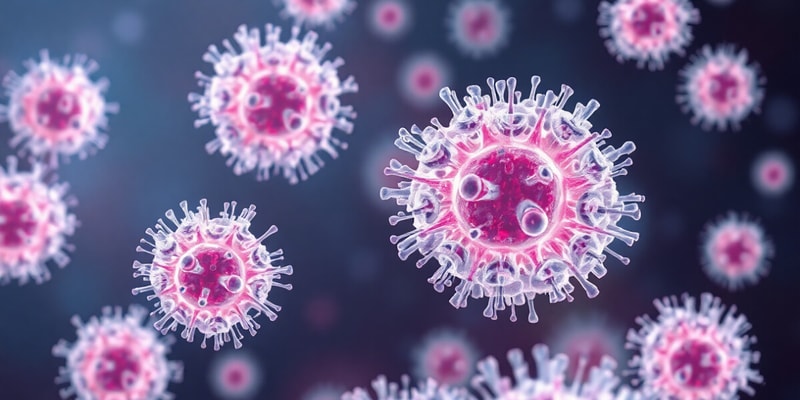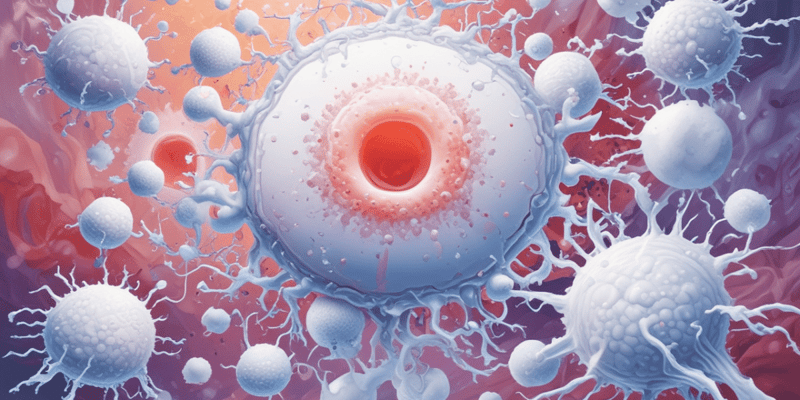Podcast
Questions and Answers
Which type of lymphocyte is primarily responsible for antibody production?
Which type of lymphocyte is primarily responsible for antibody production?
What type of immunity involves the recognition of self versus non-self antigens?
What type of immunity involves the recognition of self versus non-self antigens?
Which cells are known for immunological surveillance and targeting virally infected cells?
Which cells are known for immunological surveillance and targeting virally infected cells?
During the inflammatory response, which of the following is not a characteristic event?
During the inflammatory response, which of the following is not a characteristic event?
Signup and view all the answers
What is the primary function of T Cytotoxic Cells?
What is the primary function of T Cytotoxic Cells?
Signup and view all the answers
What describes acquired passive immunity?
What describes acquired passive immunity?
Signup and view all the answers
Which of the following is primarily a function of granulocytes?
Which of the following is primarily a function of granulocytes?
Signup and view all the answers
What role do interleukins play in the immune system?
What role do interleukins play in the immune system?
Signup and view all the answers
Which type of immunity is characterized by immediate response and includes barriers such as skin and mucous membranes?
Which type of immunity is characterized by immediate response and includes barriers such as skin and mucous membranes?
Signup and view all the answers
Which of the following types of lymphocytes helps activate B cells?
Which of the following types of lymphocytes helps activate B cells?
Signup and view all the answers
Study Notes
White Blood Cells
- White blood cells are also called leukocytes
- Granulocytes have granules within their cytoplasm
- Agranulocytes lack granules in their cytoplasm
- Normal white blood cell count is 5,000-9,000 per microliter
Lymphocytes
- NK cells provide immunological surveillance
- NK cells are cytotoxic: they kill cells
- NK cells are non-specific
- NK cells fight viruses, bacteria, parasites and tumors
- B cells are also called B lymphocytes
- B cells form plasma cells
- Plasma cells produce antibodies
- Antibodies bind to antigens
- Through antibody binding, antigens can be recognized by the immune system and subsequently destroyed
- This process is called opsonization
T Lymphocytes
- There are three classes of T cells: TH, TC and TS cells
- TH cells are also called T helper cells
- TC cells are also called T cytotoxic cells or T killer cells
- TS cells are also called T suppressor cells or T regulatory cells
Immunity
- Immunity is a resistance to infection from a pathogen
- Antigens are "foreign" or "non-self" molecules that the immune system can recognize
- The immune system identifies and destroys antigens
- There are two basic types of immunity: Non-specific (Innate) and Specific (Adaptive)
Non-specific/innate immunity
- Non-specific immunity is the body's first line of defense
- It acts against any pathogen
- It is often called "natural" or "native" immunity
- Examples of non-specific immunity:
- Skin: a physical barrier
- Mucous membranes: trap pathogens
- Stomach acid - inactivates pathogens
- Tears, saliva, and other bodily fluids contain enzymes that break down pathogens
- Phagocytes: neutrophils and macrophages engulf and destroy pathogens
- Natural killer (NK) cells: destroy infected or cancerous cells
- Complement system: a group of proteins that help to kill pathogens
- Inflammatory response: helps to isolate and destroy pathogens
The Inflammatory Response
- The inflammatory response is triggered by tissue damage
- The inflammatory response involves redness, swelling, heat and pain
- The inflammatory response dilates blood vessels
- The inflammatory response increases permeability of blood vessels
- The inflammatory response draws phagocytes to the site of infection
- The inflammatory response causes fluid to leak out of capillaries into tissue
- This fluid contains leukocytes, antibodies, and other immune components that fight the infection
Studying That Suits You
Use AI to generate personalized quizzes and flashcards to suit your learning preferences.
Related Documents
Description
Test your knowledge on the different types of white blood cells, including their functions and classifications. This quiz covers key aspects of lymphocytes and their role in immunity, including the various types of T cells and the process of opsonization. Prepare to explore the fascinating world of the immune system!




